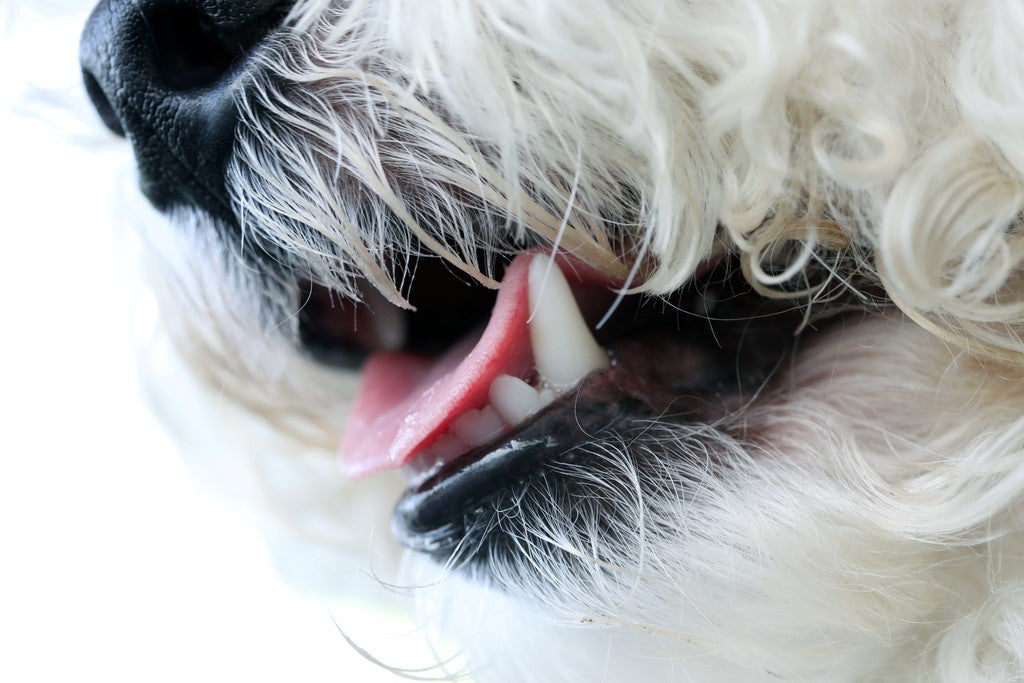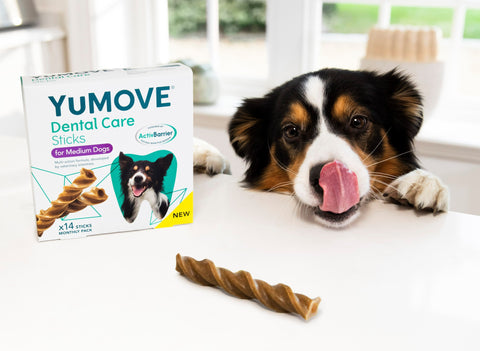

What’s the real cost of not looking after your dog’s teeth?
By Dr. Hannah Godfrey BVetMed MRCVS
We all know how important it is to keep our teeth healthy. After all, a toothache is incredibly painful, and halitosis can be embarrassing. But what about our canine companions? I'm sure every pet parent would agree that their dog's dental care is just as important as ours, and shouldn't that include their oral health, too? So, what are the consequences of poor dental health in dogs? And how much could it cost you to get your pooch’s smile back to its former glory?
Why are healthy teeth important for your dog?
The truth of the matter is humans don't just care about their teeth for health reasons – they also care about aesthetics. Many people want straight teeth and a dazzling white smile. Of course, this isn't the case for dogs! Dogs need healthy teeth for the most fundamental reasons: eating comfortably, displaying their normal behaviours, and being free from pain and infection. Healthy teeth allow your dog to pick up and chew their food, as well as being useful for enrichment activities like chews and toys.
How can you look after your dog’s teeth?
The single most effective thing you can do to keep your dog’s mouth healthy is to brush their teeth regularly. Check out our detailed guide to brushing your dog’s teeth, for the most important dos and don’ts of canine dental care.
Your vet will examine your dog’s teeth regularly, usually at their vaccination appointment, but if you have concerns about your dog’s teeth, you should get in touch with them before then.
What happens if you don’t look after your dog’s teeth?
Without regular home care, your dog’s oral health will deteriorate gradually over time. Here are the potential consequences of neglecting your dog’s pearly whites:
-
Periodontal disease
Without regular brushing, bacteria in your dog’s mouth will lead to plaque build-up on their teeth and under the gumline. Over time, this build-up leads to inflammation and tartar. If your dog has periodontal disease, they will need a dental procedure to remove the tartar, known as a scale and polish. Although humans can just visit the hygienist at their local dental practice, dogs need an anaesthetic so they stay still for the procedure. They might also need pain relief and antibiotics to help prepare them for the procedure or to help them recover afterwards.
-
Tooth loss
When periodontal disease becomes advanced, the tissues that support the tooth in its socket start to degenerate. This means that the gums recede, and the bones surrounding the tooth root dissolve. This causes the tooth to become unstable, and it may fall out or require removal. Dogs' canine teeth have very long roots, and some of their molars have three roots. These teeth can be challenging to remove and might need to be removed surgically, using a drill to remove some of the jawbone.
-
Abscess
As you already know, there’s a lot of bacteria in a dog’s mouth. If a tooth’s root is exposed or the gum surrounding it becomes inflamed and stops forming a seal, bacteria can track up into the socket and cause a malar or tooth root abscess. This infection commonly spreads to the sinuses and causes a swelling visible below your dog’s eye. This type of abscess can also occur if your dog fractures their tooth, exposing the pulp cavity. If your dog has a molar abscess, it can cause pain to your dog and will need to be treated by a vet.
-
Pain
Periodontal disease nearly always causes pain – and we understand that thought can be upsetting for dog parents, when all you want for them is to be happy and pain-free. This pain can range from mild discomfort with gingivitis, to severe, debilitating pain caused by abscesses or infection. It's important to remember that your dog can't tell you verbally that they're feeling pain, but that doesn't mean there aren't signs if you look for them, so you can ensure they’re not suffering in silence. You might notice your furry friend isn't as interested in food as they used to be or that they hesitate before eating, taking a treat, or picking up a toy. You might see them dropping food while they eat or yelping when they chew in a particular part of their mouth.
-
Halitosis
It's not just humans who experience bad breath. If your dog's teeth aren't very healthy, you might find yourself flinching when they give you a slobbery kiss or turning your face away when they're panting nearby. Halitosis is caused by the bacteria in the mouth. A course of antibiotics will improve it, but it will sadly soon return without the proper dental treatment.
-
Weight loss
If your dog isn't eating because their mouth is sore, they're bound to lose weight. If they've lost a lot of weight, your veterinarian might want to check a blood sample before giving them an anaesthetic to ensure their organs are healthy and can cope with the anaesthetic.
-
Life-threatening infections
Having a mouth full of bacteria doesn't just make your dog prone to infection in their mouth. The mouth and gums are so full of blood vessels that a severe dental infection can very quickly lead to sepsis. Bacteria can also occasionally travel via the blood to the heart, causing an infection of the heart valves known as endocarditis. Although rare, both conditions are severe and sadly often fatal. Bad teeth have also been linked with kidney disease, liver disease, and strokes.
So, how much does it cost to fix?
Dental work is very skilled, and often both challenging and time-consuming. Not to mention traumatic for owners, when your dog is put under anaesthetic. When it comes to your dog's teeth, preventing problems is the best way. The cost of medication and procedures will vary depending on your location, your dog’s size, and the severity of your dog's condition. Still, the price ranges below should give you a rough idea.
-
Antibiotics
Your dog might need a course of antibiotics before their dental procedure. This lowers the bacteria numbers in the mouth, clearing any infection and ensuring the tissue is healthy enough to heal after the procedure. It's also the case that your dog may be prescribed an antibiotic course following the procedure, especially if they have had a surgical tooth extraction.
Cost of a one-week antibiotic course: £40 - £80
-
Pain relief
Most forms of dental disease will require pain relief in some form. It’s often used to aid recovery after tooth extractions and might be continued for 5-7 days after the procedure. The type of pain relief or anti-inflammatory used will depend on the severity of your dog's pain.
Cost of one week of pain relief: £40 - £80
-
Scale and polish (under anaesthetic)
If your dog has tartar on their teeth, they’ll need to have it removed. This is called de-scaling, and it involves using an ultrasonic instrument to break up the tartar. After the tartar is removed, the tooth's surface is polished using abrasive toothpaste. This will make your dog’s teeth squeaky clean, but unfortunately, without homecare, the bacteria, plaque, and tartar will soon return.
Cost of a scale and polish under anaesthetic: £120 - £250
-
Dental X-rays
Your dentist might take X-rays of your teeth every couple of years to check that they are healthy. Sometimes, vets use dental X-rays to check whether a tooth needs removing and whether the root is diseased. They can also be helpful during complicated extractions. Some veterinary practices will account for dental X-rays in their standard dental fee, but others will charge them additionally.
Cost of dental X-rays: £35 - £75
-
Tooth removal (under anaesthetic)
If a tooth needs to be removed, the cost will vary depending on whether it's a straightforward, single-rooted incisor or a more challenging extraction like a canine or triple-rooted molar. It will also be more expensive if the tooth needs to be removed surgically. If your dog has extensive dental disease, the vet may need to schedule two separate procedures to minimise the risks associated with a long anaesthetic. Of course, in addition to the monetary cost of procedures that require your dog to be under anaesthetic, we understand it can be a really worrying time for owners, too.
Cost of dental extractions: £200 - £1,000 (depending on the number of extractions)
Why prevention is so important
There’s no denying that getting treatment for your dog’s dental disease isn't cheap. Still, it's important to remember that dentistry requires a great deal of skill and the consequences of not treating the teeth can be severe. If you’re able to commit to caring for your dog’s teeth at home by brushing their teeth, using antibacterial gels, or dental food or chews, you could save yourself a great deal of money. However, more importantly, you'll be making sure your furry friend is healthy, happy and pain-free.

How do you look after your dog’s teeth? Share your dog’s dental routine with us and fellow dog lovers over on our Instagram and Facebook pages. We’d love to hear from you!


